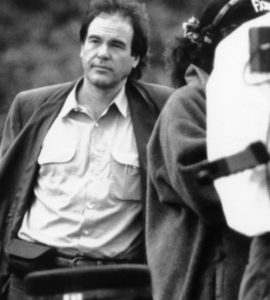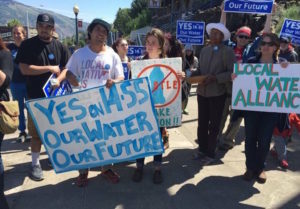Podcast: Play in new window | Download
JFK Revisited: Through the Looking Glass
President John F. Kennedy was assassinated on November 22, 1963, 58 years ago. Assassination is a political murder. His murder was a turning point in American history. The first question needed to be ask in a murder case is why. The second question is who.
Today we discuss this catastrophic turn in American history with filmmaker Oliver Stone who directed his just released new documentary JFK Revisited: Through the Looking Glass. Stone uses evidence from the “Assassination Record Review Board“ to bolster our understanding that the assassination was not accomplished by a lone individual, Lee Harvey Oswald.
Kennedy was killed because he was pushing for the detente. He wanted to end the nuclear arms race with the Soviet Union. He wanted to get American troops out of Vietnam and end its counterrevolutionary involvement.
President Kennedy wanted to re-establish relations with Castro and revolutionary Cuba. He wanted to support the independent former colonial countries like the Congo. It was for this that he was murdered and the course of American history was changed.
One of the first things the new president Lyndon Johnson did – he had been Kennedy‘s Vice President – after he was installed, was to reverse Kennedy‘s order initiating the withdrawal of American troops in Vietnam. Instead Johnson escalated the war, eventually putting a half million American soldiers on the ground in that tragically ravished country, killing some 3 million Vietnamese people, including 53,000 American soldiers.
Guest – Oliver Stone, filmmaker, author, his 1991 movie “JFK“ was nominated for four Oscars, winning two of them. His new documentary JFK Revisited : Through the Looking Glass has been pretty much ignored by the mainstream American media.
—-
The Trend Toward Water And Waste Privatization
By 2025, two-thirds of the world’s population will be out of fresh drinking water, according to the World Bank. Fortune magazine recently called water “the oil of the 21st century.”
This situation has private companies flocking to privatize water delivery in areas parched for water. Rather than helping to protect existing water supplies, increase conservation measures, stem pollution, and assist needy populations, pressure mounts to commodify and profit from this natural resource and most fundamental human need.
Similarly, the National Waste and Recycling Association supports privatizing waste and recycling collection services at all levels of government. And Americans produce a lot of waste: on average at least 4.4 pounds each a day, or at least 728,000 tons total per day.
Private water companies have existed in the US for more than 200 years; today there are thousands serving more than 73 million Americans. And as of 1995, half of the nation used private waste management companies. But that’s one of the most dangerous jobs in the nation, with often lax job safety: in NYC private sanitation trucks killed 7 people in 2017; city municipal sanitation trucks haven’t killed anyone since 2014.
Privatization often brings rate hikes, decreased water quality, less reliability, and poor customer service. The average US community with privatized water paid 59 percent more than those with government supplied water. New Jersey has more private water systems than most states, and they charged 79% more. In Illinois, they charged 95% more.
Private water corporations have also been implicated in environmental disasters. The French multinational, Veolia, issued a report in 2015 certifying that Flint, Michigan’s water system met EPA standards, but neglected to mention high lead concentrations.
Guest – Attorney Terry Lodge is from Toledo where he specializes in environmental and energy issues. He is associated with the nonprofit Community Environmental Legal Defense Fund, which offers free and affordable legal services.
Guest – Lindsey Schromen-Wawrin an attorney at Shearwater Law PLLC also affiliated with Community Environmental Legal Defense Fund since 2013, He serves as a city councilor in Port Angeles, Washington, and is a member of the International Parliamentary Alliance for the Recognition of Ecocide.
——————————————-




